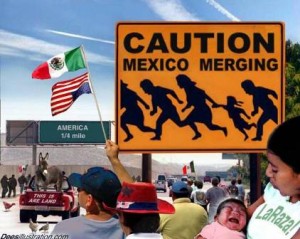
@NataliaGnecco
Thanks to the Conference of Montreal 2009, I had the opportunity to meet Demetrios Papademetriou, President and Member of the Migration Policy Institute (MPI) and he gave a great speech called “Migration, Productivity and Competition: The Challenges of Integration”. Few months later I decided to contact him to further explore controversial issues such as how Americans and Canadians deal with immigration and integration.
Demetrios , how did Canada cope with the economic crisis in terms of immigration?
I was in Canada in February 2009 and the Minister said that they would constantly observe and evaluate both, the economy and the immigration program to make sure that the immigration program will continue to contribute to competitive mass and growth of Canada. To the best of my knowledge immigration policies continued essentially the same, with the exception of the requirement for Mexicans to obtain visas when entering Canada.
It seems logical that Canada attacked the recession by building up its human capital and also being attentive to the job market and to employer’s demands so that Canadian economy remained competitive in the world markets. There is also a need to make provisions so that new immigrants can be employed rather than to be underemployed.
Is the United States really concerned about expert-qualified immigrants?
United States follows a different approach with regards to the highly skilled immigrants and there are two ways of doing this. First, we basically allow Americans employers to hire the highly skilled people that they require for their business. One way of doing this is to hire immigrants who are studying at the bachelor or master levels in their countries so when they arrived to the US they will immediately be employed.
Under-employment of immigrants in Canada seems to be a steady problem. Newly arrived immigrants can not exercise their profession or can not find an employer that would hire them. This is a significant problem for Canada and efforts are being made in order to fix this.
And second?
Secondly, in the US very few of our professions are really protected , I mean the professional’s qualification requirements in order to get a license to practice an occupation is less than in Canada where you need to get a license to practice many occupations so the restrictions for practicing your occupation in the United Stated are far less than they are in Canada. That also allows people to work in their own profession.
What about integration?
In terms of integration Canada does better that the United States because you have multiculturalism and you already have a system- particularly in Quebec- and also in other Canadian provinces of investing in integration through language courses. In the United States huge investments are made at the federal level on integration efforts and although we have spent a lot of money on language training, we have not done it as systematically or as automatically as Canada does.
If you compare various states in the United States versus the provinces in Canada, they are some states like New York and Illinois which are huge and invest quite a bit in the integration of immigrants, however, in Canada they support integration measures more systematically than any state in the United States. So, in terms of integration I suspect that Canada thinks harder about it, invest more money and the result is better outcomes that the United States has on average.
Why did you mean by saying that the transition from migration system to a mobility system is galloping ahead more than in other instances?
Let me tell you what I mean by that. In places like Canada in particular, the assumption is that if someone comes to Canada essentially you know they are going to be Canadian, they are going to live there, and maybe they will die there. As a result, you know, the system is focused much more in permanent immigration and landed immigrants. In the last two or three years Canada has created new opportunities for temporary migration of people which is a smart thing to do, we will figure out in the future whether some mistakes have being made in this regard.
For many years we had to deal with illegal immigration but interestingly we have discovered that during the recession in 2008 was this area of immigration that helped the economy move forward and when jobs started to disappear in the US, new illegal immigrants stopped coming. In fact illegal immigration in the US has not increased at all since the end of 2006 or beginning of 2007. So, in a strange way illegal immigration is more in tune with the economic cycle. All illegal immigrants come to the US looking for jobs, when jobs disappear they are afraid to come. This is also a big difference with Canada.
And how does this affect the mobility?
Mobility is a fact of life. More and more people move. They settle down for a while and move again. It will be interesting to see the future of migration where people stay five, seven or ten years and then go. It will be an interesting challenge to the system, whether it is yours or ours. It used to be long time ago, in the first half of the twentieth century that almost 50% of immigrants actually returned to where they were came from. The last decade that number has dropped to less than 30% and, I wonder whether that number will not go higher as we are moving into a new mobility system.
However, the rest of us, we are not really concerned with integration, as long as immigrants pay taxes or give their contribution to society, most of us do not worry about the steady number of immigrants that arrive. I suspect than twenty or forty years from now, what we are going to see is that mobility system works better and better, so people will be with more skilled, more educated and will speak more languages. People will come either to protect themselves, or to work but migration will continue to increase and include different types of people.
Finally how do you visualize the immigrants and its role as politicians?
I believe Canada does much better. People from immigrant origins occupy all walks of life including the Parliament and Ministries, not so in the US. Here you would hardly see that there are first generation immigrants serving even in the house of the senators. I think that congress and senators are the fifth generation immigrants but I have not done that comparison so I am not quite sure.
Photos: Dee Illustration, progresosemanal.us
Guest Editor: Ines Marchand








Well ,that rule has proven to be ineffective… read my comment again and think about the facts I wrote about and you should also read Miss Gnecco’s comment again for there is a clear connection: how highly skilled immigrants adapt to the labour market of these countries.
Califica:
-
Me
gusta
0
- No me
gusta
0
ReportarALFONSO700660: Although your comment is a little confusing, if you live in Canada, you must be aware that, in order for any professional coming from overseas and trying to practice as a medical doctor in any field, as a lawyer, engineer, dentist, you need to validate your degree, pass the medical association examination, the bar association for lawyers or the one related to your profession. The permits and practice vary from each province. Also, you need to pass the ESL exam, etc. It is not easy, but that is the rule. You also need to pay a very high insurance to cover your butt in case of a malpractice. I do believe that the system it is not perfect but, much better the one you have in many countries included the USA and Colombia among others. Do not forget that the system that you are criticizing is free for you when you need it with some exceptions. On the other hand, I do not see any relation between your comments and Mrs. Genecco article.
Califica:
-
Me
gusta
0
- No me
gusta
0
ReportarContrary to the previous comment I do not find Miss. Gnecco’s article outdated. As someone who presently lives in Canada I can affirm that there is a lot of discrimination in the labour market and little or nothing has been done to properly adress this issue. The governments will not tell you what they do wrong due to their lack of interest or for any other hidden reason, that is why the best source will always be the testimonies of the immigrants. It is true that many of us succeed in finding a job in certain professions, but it is extremely hard to do so in many others. For example : most of the computer engineers do not have a hard time finding a job in alberta or british columbia, however if you are a doctor, psychologist or lawyer it can take a really long time before you get permission to practice your profession. I personally find this unfair, for many of the doctors that come to Canada from south america or the middle east possess greater knowledge than some Canadian doctors. A proof of this argument is the case of the colombian young man who died in a Canadian hospital , because the doctors that studied his symptoms did not know how to treat any tropical flu. Also, many Canadian doctors do not work with the most technologically advanced equipment, you can go check l’hopital saint luc in montreal to confirm this fact. Another issue is having to be admitted to an order, which can take a long time and is up to some of its members who might or not be the most appropiate to decide whether or not a professional can continue working in the same field he had been doing for years in his country.
Califica:
-
Me
gusta
0
- No me
gusta
0
ReportarOther than the personal interest from Mrs. Genecco, and fulfill her commitment to write something for this paper, I do not find anything new or interesting about this particular article. A couple of questions from a six years old interview do not offer a picture of the reality today in a very challenging and changing times. If she wanted to write for all audiences especially for the young people looking to make a new life in the USA or Canada, she could very well had the tools to research and find documents and interviews as new as June of this year.
Califica:
-
Me
gusta
0
- No me
gusta
0
Reportar